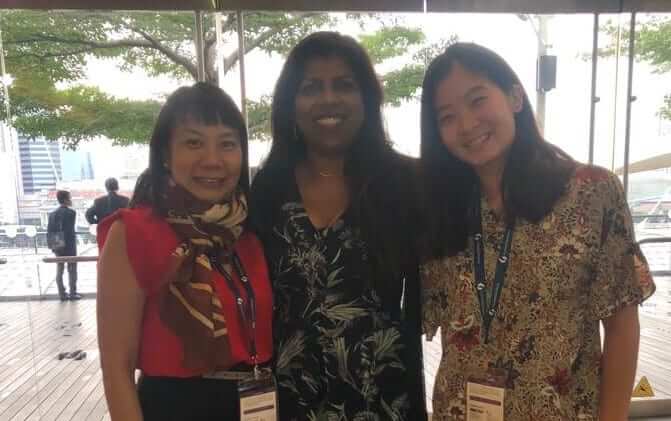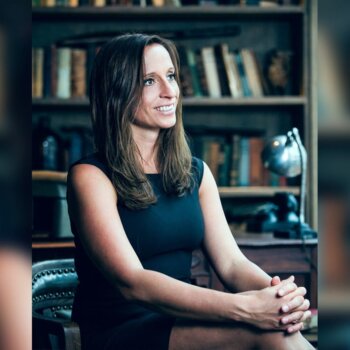(Women on Top in Tech is a series about Women Founders, CEOs, and Leaders in technology. It aims to amplify and bring to the fore diversity in leadership in technology.)
Sharala is leading the data-driven business transformation and driving the benchmark for data science education in the ASEAN region, with her passion for data science and over 15 years of experience in the telecommunications field under her belt. A thought leader in the data science space, she is a highly sought after speaker for conferences with topics ranging from analytics to women in STEM. She is an award-winner of the EY Woman Entrepreneur Of The Year 2017 Malaysia, SEBA 2018 Woman Technopreneur of the Year and among the Digerati 50 by Digital News Asia (DNA). CADS is ASEAN’s first and only one stop platform and center of excellence for Data Science.
She was part of the team that brought in The Data Incubator (an American-based data science center) to Malaysia, launched ASEAN’s first data science accelerator program in 2016 and spearheaded an initiative with the Harvard Business School in Boston to support Malaysia’s national agenda to be the hub for Big Data Analytics (BDA). Prior to CADS, she worked with a diverse set of clients to deliver hands on training through several workshops and trainings on GPRS Performance Analysis and Optimisation. As the Founder and Managing Director of ULearn, Sharala and her team was successful with the Hands On Technology Training (HOTT), eventually evolving to be the first in the industry to develop an Automated Competency Gap Analysis (UrSkillsReporter).
What makes you do what you do?
This is the million-dollar question. If you asked me, engineering made me do what I do. I am going to give you a bit of history. This is not something I dreamed of; I never thought I was going to be an entrepreneur like I am today and leave my country. I come from a very small Indian Tamil family, in a small town up in Penang, North of Malaysia. If you look at companies that come from Penang, we all do very good in academics and we work great with companies and make them greater. I wanted to be doing engineering for simple reasons: Math and Physics came easier than biology. My parents would have loved for me to become a teacher or a banker, and when I wanted to do engineering and my mom said to me, literally “who will marry you?” and that was interesting. So, I did go to the local university and take engineering. And then my mom always asks, “what is this you are always looking for?” I left for Europe and then when I came back, I started analytics. I think my parents were accepting but they said “you know we could support you with all the technical and academic stuff but now you want to start a business? We are a Tamil family; we do not know how to run a business.” It was important for me because when I came back to Malaysia, and I would like to take myself to be one of the brain-drains; Malaysia and part of ASEAN are one of the largest that has brain-drain. So, when I came back for me it was very important to have a business that answers: how do I stop people from leaving, and how do I keep people like me to come back. I left because I did not have something sexy to do, as simple as that. You do not want to do repetitive stuff; you want to do things that make you want to do more. Therefore, the reason I am doing what I am doing is that if you love what you are doing, it is not a job.
I think a few of my colleagues have felt this way as well. It is never TGIF because every day you wake up and you know the goal post moves. There are people who talk about burnout, and people who feel this way are employees. I guess that is what it is. It is very hard to put it into the context of work. I love what I do, and I get up in the morning and I look forward to doing what I am doing. I will share with you a story about my son. Every morning, it is a drama going to school. He will say “oh I do not want to go to school” and I have to tell him: Anton why do kids have to go to school? It is so that you earn enough to buy all the toys in the world. I had to make it more relatable. This what my parents used to say to me: “do not disturb dad because he is going to work. He is going to earn”. Sometimes, he will ask me this question: “mama why do our adults have to go to work and earn money?” because he does not want me to travel, and I remember I replied: “mama goes to work because she loves doing what she does, so it is not about money”. I mean my parents used to say that and I never questioned why my dad had to work double shifts. I think that question from my son was an awakening moment, even for me; to tell my son that I am not going to work because I have to. Nobody should. I tell my staff and colleagues that the day that they struggle to get up from bed is the day they should come and have this conversation with me. Nobody deserves to do what they do not want to.
How did you rise in the industry you are in?
When I started analytics, it was around 2013-2014, and it was a fairly new industry. The whole big data industry only came in around that time in USA so in Malaysia it was very difficult. I always say this, even in the UI interviews, that I do not think it is more difficult being a woman; if so, it is easier. In the tech world, men do have soft spots for women. They will give you the time of day, but you need to bring your A game, and I do not think it can be easier for the guy. I always say that. I would like to be the damsel in distress, but it is really not the case; you got to bring your A game. You have a better chance for people to open the door [for you] but if you do not bring the A game, then you will get out of the tech scene as fast as you entered. I guess the part of when I started, there was a lot of questions like is this just going be another hype. I used to sit down with universities’ vice-chancellors where top universities are refusing to make the change because they do not want to get caught in the hype. It is easier for me to talk about it now but at that time it was so difficult. In Malaysia and ASEAN, we did not have the Facebook, and we did not invent Microsoft. We did have the technology, but we have AirAsia and the Petronas. The question is: how do you go to them and say that if you do not change now, Alibaba is going to take you back? Telcos are going to be very financial. And although this industry is still young and precisely because companies always think “it is not going to happen to me”, you must tell businesses that they have to transform, you have got to be ready, and everybody second guessed this advice, but quickly it changed.
I could have gone bust in the very first year if I did not stick on. Knowing my instincts felt right, and there was data showing that [the takeover] was going to happen but we just did not know when. We had a first-moment advantage because we stuck to it, we truly believed in data. Every conversation I have with companies today – does not matter if it is a telco, or it is Chatime [a bubble tea business] – all these companies wanted to know whether they will have customers and when. It just felt so right for me to work with data. Then, I had a bigger ambition that I want to build a solution. However, I quickly realized that I did not have the talent for building solutions, then looked around and that was how I decided to work on building talents.
What is your business model like?
We started off as training education company and now that industry has taken us in so we get onboard and work with them as a human capital tech partner that can quickly identify talents. So, if a company has 3,000 people, we can efficiently identify who are their domain experts that can become a data professional. Data scientists are the top of the pinnacle, and then you have data analysts, data engineers, data visualization and then we have created a new term called ‘data scientist’ for businesses, which helps to frame questions. That is the biggest challenge that people have. Once we have set that, then we actually draw out the learning pathway for how they will grow into the specific role that they applied. Therefore, the training education industry sort of gave us the quadrant and now we do this for banks; we have all the top ten banks and telcos.
Did you do personality testing to identify the talents or how do you know what to look out for in a potential good data scientist?
We do both [personality testing and looking out for signals]; we do hard skills and what I call smart skills. Smart skills include critical thinking, agility, and how do they think. Hard skills will be basic programming, mathematics, statistics, and communication skills.
So, you made it into a tool that you use to identify talents?
Yes, we call it ‘TalentSpy’.
Do you use ‘TalentSpy’ only in Malaysia or are you planning to use it elsewhere?
Yes, so we have set up our company in Singapore. I think Singapore would be the ASEAN market but we also work with banks that have ASEAN presence, and we have oil and gas that has ASEAN presence.
Why did you take on this role/start this startup especially since this is perhaps a stretch or challenge for you (or viewed as one since you are not the usual leadership demographics)?
People think because I come from an engineering background that resulted in me becoming a data scientist in the next stage of my profession. Actually, I think engineering helps because you understand technology a little bit more but whether I want to practice engineering myself is beside the point. I have a background in telco and financial services, which was one of the few industries that was embracing analytics. I was doing projects in telco going like “I have a great network which gives me a 0.01% drop cord, but customers are still leaving me. Is it the subscription package?” So, we did a few analytics for them and we found out that the people who called to complain are not the ones who leave, but rather those who do not complain are the ones that leave. They have 1% of customers calling and they are not going to leave because they trying to help the telco, because they care. Our network analytics did not help in this situation, so we had to look at Facebook we need to look at (not sure what company) and then join there. That was when we realize that analytics is going be the next wave and because I came from a telco background, my company managed to pick up. Banks only came in much later. It was a business need that my skillset range could match that caused me to set up my startup.
With regards to being a female, I am a ‘yes’ girl so I would do whatever my parents asked me to do. But also, my brother is my idol; if he like big bikes, I will also like big bikes. I think my mom kind of accepted that I was a bit of a tomboy, and now she says she raised two boys. However, I had to do household chores while he did not. But, I think that helped because, and I am being very mean when I say this but, I had to go out and ask visitors what they would like to drink and I pass the job of washing plates to my brother. Even when I go out with friends, and because I am a girl, I usually cannot. But if my brother is allowed to go out, I will say “if he can, why not me?” Precisely because I had to fight for everything, that made me stronger and I think my brother lost on that opportunity to grow. We [as girls] have to rationalize and negotiate. Everything is a challenge for us. When I compare myself to my brother, my mom would go crazy. Her reason for me is always because I am a girl, and I do not see that as a reason. I could never understand how that is a possible reason.
Do you have a mentor that you look up to in your industries or did you look for one or how did that work?
When I first started this business, I was in Europe. I lived in Sweden for a long time [10 to 15 years]. I lived in Sweden and worked in London. Somebody gave me, I think my husband, Robert, gave me this book called ‘Beer Mat Entrepreneur’. It was about this bunch of guys who met in a bar and drew their business map on a beer mat. They spoke about 4 pillars to start a business and one of the key things mentioned was getting a mentor. After I read that, I was very eager to look for many mentors. In fact, it is not so easy to find one specific mentor. Over the 10-year period, I realized there are mentors for different areas; there are mentors for business, mentors for personal life, and other women that can help you figure out your business. I am always guilty of not being there for the kids. I remembered all my friends who used to compete in school and comparing who will become lawyers and the top ten girls of the school, but 99% of them are stay-at-home mom for the kids today. I remember telling my husband, telling him maybe I am being too ambitious and maybe I should stay at home like a mother and be with my son. And, I recall Robert telling me this: remember this, successful kids come from successful parents. Not just a successful parent, but parents. I think I would have been a nightmare if I stayed at home and I think Robert found a way to set me off. I think it was his trick to get me out of the house. But that was the whole point; to be able to discuss that with other women, other guys. Businesses grow in different phases so someone who starts with you when you are small might not be the right mentor for you to come to. So, I always have different mentors for different phases of my life.
A good mentor of mine said there is this term ‘Alpha Female’, and the men would say if you put two alpha females together, they would be sparring. And I was amazed by this term because I admire strong women, because they have something in common. However, I realized that what others say about alpha females may be true. When the insecurities of one kick in, they do not mind coaching you while you still have your insecurities. But once you become equivalent to them, that means you become a competition. For some reason men, do not see that. Maybe they all have it, maybe they do not feel it, but because there is so little women in tech, the other women would want to eliminate their competition, and I have witnessed that before. I am the first to say that women are the ones who do not encourage other women. There is a lot of talk about men being the ones being unencouraging and that could be the reason because it has happened to many women. But what I want is for women to start thinking that it is their responsibility to find who they can advocate. It must be a conscious decision; it is ever more so important to advocate for women today and I want to continue doing that. There must be mutual respect between women. I will tell you about my challenges in the company. We have 67% of SLT women and I now have to be more conscious of getting men on board and think about how we behave around them. It is a different world in my company which is made up of majority female. We have around 60 working staff now and usually, I attract strong women, both a good and bad situation. The bad part about attracting strong women is that we will get so emotional when we talk. So, I have male colleagues and we were having a small group discussion. We were all sat down and I was speaking to my Chief Strategy Officer who is a male. I asked him: “how do you take this [having more women in the office than males]?” He looked at me and said: “let me put it this way; I have had male bosses all my life and when they yell at me and get angry with me at work, I am able to have a proper conversation with them, I can talk back to them, and after that, I can go for a beer. However, being brought up and taught not to talk back to ladies, I do not know how to react when lady bosses are angry with me at work.” He says that he will panic when faced with the situation of his lady bosses getting upset and throwing a tantrum. When we heard that from him, other female bosses and even his peers went silent. This is how I learnt to be conscious of how we treat male colleagues because they are not used to having female bosses.
Because you said that you had many mentors, who mentored you for during the process of you starting up the startup and how do you end up being mentored by a female?
I had this attitude, an entrepreneur attitude, to get the business and we will figure it out. Everything was a blink and I realized that we are going after everything and I was making money but we could not grow. I met this person and he was a VP of a manufacturing company. He is a good friend of mine that I have known for years. However, it is difficult when your mentors are your friends because you will have to open up the darkest secrets of the company you worry about the outcome if the mentorship does not work out. I went to him and said I was at the stage of my company where I want to grow, and I did not know why I was not growing. Every time I made 2 million, I lost 2 million, when I should be making 4 or 6 million. He asked me how much time I needed from him, and I knew the answer for that. He decided that we should try working together and ever since we started, we had good chemistry. But, it was so annoying that he would question everything. When I was excited to bring in a deal, he would question it and dissect the deal. In my head, the deal would have been worth 3 million, when in reality it was just 50K. I used to get very frustrated with the way he challenged me, and I would tell him that he did not understand what I was doing. That was what the problem was, the good and downsides of being an entrepreneur. I had to teach myself a lot after a year. However, today, I myself do that to my colleagues, what he did to me. Although this mentorship experience was 5 years ago, I continue to question my colleagues about what they are doing. I will break them down and tell them I had to go through this as well before being where I am today. It took me a year to realize that I was doing this to them; the questioning and breaking them down. I asked myself “do we need to do that?” and “why do we need to do that?” The mentorship with my good friend nearly resulted in us not being on talking terms. I felt that he did not know enough about my business and he told me that I did not have what it takes to be an entrepreneur. For me, that was the best thing that happened to me. More importantly, we must open our mouth to ask, ask for help. It is very difficult to be an entrepreneur and some may lie about their business because they are not making money. Ultimately, it is not about making yourself look good, but rather being able to talk about the most honorable things that you cannot share with other people. You mentor should be able to be that listening ear you need.
Now as a leader how do you spot, develop, keep, grow and support your talent?
My colleagues used to tell me that every time I meet someone new, I would say that I really like the person and they will tell me that that is what I say to everyone. I am not the smartest person to be an interviewer because these people come to my company like a job hop every year and I would find a reason to think why they are constantly changing jobs. I will think to myself that they will be able to do better than me and I put some process into that. However, before that, I always attract people who want to be an entrepreneur themselves. My corporate communications lead in my company used to have a restaurant, a deli that she founded after a year, and she understands that it is impossible to go back to work for a company, as an employee, because the way we think as business owners. All my SLT’s that have left me tells me that since they have left my company, they will retire; they cannot go back to work for another company because the way they make decisions has changed for life. The impact that they see, the fact that they are unable to make important decisions on these, and the inability to take on huge responsibilities like they did before, causes them to feel stifled while working for another company. They all have spouses who work for someone else and when they discuss about such matters, my SLTs do not understand why their spouses do not see the same level of impact they see on decision making. I have done desperate hiring and made mistakes along the way. But we do not talk about the situation of desperate hiring where thousands of people apply for 2 job positions but there is only 1 person who make the cut. There is also a whole book about people who manage you; they say the right things during an interview and then you decide to hire them, but you know yourself, that they do not really know much about the company and the job. I have gone through that process before, but now, I bring in people I do not like to hire; managers hire people. I do not want a ‘yes’ man. There may be a change that I have made a mistake in the SLTs I have brought into my company, because I find that it is always about me, the fact that I want to help them get a job. But, the more I want to help and make a change, the more I attract problems when it comes to hiring the right people. I could never understand this philosophy because to me, I know I can do so much to change the problem and that would enable my company to prosper, but I had bosses who told me that I actually do not have such capability. Therefore, I am always afraid that I will have some team members who will think of themselves the way I did. These members will outshine the rest but there is a need for the younger members to stand out. I now have a process when it comes to hiring someone. For example, if I want someone onboard the Data Science team, I am not going to need a hiring manager. I will have the corporate communications team step in instead and let the candidate have a feel of the pace working with the Data Science team. What we want them to understand is the culture of working with us and for themselves to decide if they can work at such a pace and with the people who could be on their team in future. It is still a work in progress because along the way there will be a lot of mistakes made before you know what the right thing is to do. But that is how things are. If you want to be an entrepreneur, you can quit your previous job, but I highly recommend you join my team and we will all make it together as a team, rather than an employer-employee relationship.
Do you consciously or unconsciously support diversity and why?
When there are a lot of women in your company, there tends to be a lot of drama that comes along with it. Because I say it openly, and because I talk about it, I avoid such drama in my company. I entertain myself with such talks and I joke about it. There are many things I take to heart and sometimes, my husband and mentors will tell me that I am being “too woman about it”. There are certain things that I cannot let go and these things are not big issues. PMS also does not help. I have to be honest about such things because of the self-realization aspect to this. I make it a point to question whether I am being fair to others around me, whether I am being right, and whether I am making an emotion decision. Sometimes, I want to make emotional decision, but what is most important is that it was a conscious decision on my part to be emotional. Therefore, I surround myself with both men and women to balance that part of me out. The country that you come from, and the language that you speak are also important factors. We are a multinational company, and although we all speak English, we do not understand certain things the same way. That’s why it is important to always communicate with one another, to discuss a lot. I always say, “if you aspire to be a global company, you must hire global people”. We cannot hire people from different nations and assume we are global. Having lived abroad in Sweden myself, I realized how amazing it was to have the opportunity to live there that changed my mind. I recall going to the train station there and there was no one who checks whether we pay for our train ride. And I understood the trust system that works in this case; because we do the right thing to pay for our rides, the system that takes us to work runs smoothly. However, if we do not pay, the system would breakdown. With my children, there was an occasion where we were in a shop and they were playing with some small toys left behind by someone else. I told my daughter that if she wanted the toys, she can take it. And then, my daughter looked at me and she told me, “mama, it is not ours to take”. And I turned to my son and said, “if you want it, I can ask the sales person who left it behind”, and he replied saying that the kid who left it behind might come back to find them. I told him it was his loss but putting this into perspective, and having lived abroad before, our values were different. My children have their Asian values while I have mine. But this episode made me understand that having a global team will help you to look at things and challenge yourself differently. That is why I consciously work on diversity in every way possible.
What is your take on what it takes to be a great leader in your industry and as a general rule of thumb?
I got so uptight being a follower in Asia and ASEAN. Here, we have manufacturing and we always can use somebody’s technology and produce food. I was tired of being a follower and felt like I was just doing someone else’s work. It was important for me to look at this problem and be a game changer. That was the key factor to me being a leader. How do we innovate and be a game changer? That was the question to be solved. The number one rule for everybody to become a top leader is really to read. When you read, you will think outside the box with all the knowledge that you have. You get ideas from reading, but you just do not follow through with it. You have a mind of your own and you understand what you are trying to do, but what is the difference you are going to make? I think for women in tech, we tend to be very silent and we tend to only see what we know about this tech we are working with because we are so excited about it. Our need to be a top leader is secondary to us. I think reading is the way you differentiate yourself and the only way you are going to grow is through reading. You have to be constantly reading and what you are reading does not necessarily have to be relevant to what you are going. Because I am an entrepreneur, it does not mean I have to read a book on entrepreneur. In fact, I read very little about technology because I think technology will always come and go. You know what it takes to build a business and how not to feel lonely being at the top. I think that is the number one rule. I want to pay the part of differentiating myself and it feels good to know if you have made an impact. You must always feel good about what you are doing. The moment you feel bad about it, you should take a step back and take a look at it.
Advice for others?
Generally, people are afraid to venture into the unknown. My industry is data analytics, data science, and people think that you have to be a scientist to become a data scientist. This is the sexist job of the century because it is revolutionizing businesses. For me, I want more. If you are targeting to having more girls in your company, get the best. STEM is the base you need to get into science technology. Women make up about 60% of the engineering course of a university, but only 33% of them enter the workforce and this upsets me. Many ask me how I juggle between being in this industry and having 2 children. I can manage what I am doing today because of the support I am getting. My husband is very supportive, and I leech on my parents on helping to take care of my kids. I am not afraid and not embarrassed to ask for help. This is the expectation of being a supermom. When I had my daughter, I wanted to breastfeed her because that is supposed to be the “cool thing”. But my daughter would not latch, so I would pump, day and night. I felt like I failed. My mom used to say that I grew up with formula [milk] and I could feed my daughter with formula too, but I did not want to. In the end, I quit breastfeeding because it was not working out, but I would breastfeed whenever I can. I realized this thing about being a supermom: you will feel guilty for things you are unable to provide for your children. My son was performing as a penguin in a dialogue in school and I could not make it. I told him that his grandmother could videotape it and he just said “ok”. He made me feel guilty; he expected me to be there for him and I had to tell him about the things I had to do with my company. These experiences made me stronger. Back in my days, my parents would not attend many things. I used to be upset with my father but I understand now that they could not take time out and I should not have expected some things from them. Usually, I will go to the school to help out as much as I can in small areas. I will try to work things out with my son and his activities in school, to support him. Often, women feel guilty for not being the woman they are expected to be. I usually forget about such societal expectations and admit that sometimes things just do not work out the way you would like it to.
If you’d like to get in touch with Sharala Axryd, please feel free to reach her at
https://www.linkedin.com/in/sharalaaxryd/
This article was co-written with Foo En Jing.
LinkedIn: https://www.linkedin.com/in/fooenjing

Foo En Jing is an intern and cub reporter with Women on Top in Tech (WTT) for Asian Entrepreneur. She is in her Bachelor’s studies in Sociology and has a passion in raising awareness for the challenges women in tech faces. She was exposed to the problems that women face as a minority group in tech and is writing an article to articulate and project these issues. She has devoted her time to work on WTT as her summer internship and hopes to see tangible changes in the tech ecosystem.





























